Systematic stepwise training approach for testing laboratories


Learning is an on-going process. No individual can claim that he knows everything and there is nothing more left to be learnt. It goes without saying that each day we are gaining something or the other new through observation, reading, internet surfing, discussions with friends, family members and colleagues or through organized training programs.
Training and Development is an essential contributor to an organization as well as for an individual’s sustained growth. A laboratory is a good example of an organization which offers technical professionals ample opportunity for growth. There is a constant need for up gradation of knowledge and skills to meet the organizations requirements and to reap the benefits of technical advancements.
A systematic stepwise training approach is presented which could prove to be of immense benefit to the laboratory as well as the new entrants.
Stage-I Induction Training
Induction Training is a process of introducing a new entrant to the organization, its objectives, policies and practices. In order to be effective induction training should be arranged at the earliest opportunity after the new entrants join. This applies to raw entrants as well as experienced persons as all joinees should get acquainted with the culture and conventions of the new organization. The purpose of the induction program is to familiarize the new entrant with the organization and its work environment only so at this stage the trainees should not be burdened with technical details.
Stage-II Training on Safety
A laboratory can expose an individual to several hazards due to presence of hazardous materials and operations involving use of such materials.
Essentially the following aspects should be covered under safety training:
- Laboratory discipline
- Safety gear and its use
- Classification of hazardous materials
- Material safety data sheets
- Safe handling of laboratory glassware
- Management of laboratory spills
- Disposal of laboratory wastes
- Basic fire fighting
- Evacuation plans in case of accidents and emergencies
The above topics should be covered over multiple sessions and not rushed through in a single session.
Stage-III Training on Quality Management Systems
Each laboratory develops its own Quality manual which defines its quality policies. Such policies are based on guidelines laid down by both national and international regulatory bodies. An understanding of requirements outlined in the quality manual is a must for all laboratory analysts. Adherence to quality policies is essential for building up customer confidence. Essentials of Good laboratory and Good documentation practices, which constitute the backbone of all laboratory activities, should also be introduced at this stage.
Stage- IV Awareness on Global Standard Organizations
Awareness training on role of global standard bodies such as ISO, NIST, EPA , ASTM, Pharmacopoeias, AOAC, etc is best introduced at this stage. This will help the trainee appreciate the need for following the prescribed norms for upkeep of the laboratory’s reputation and recognition as a world class testing facility.
Stage-V Training on test procedures
Training on test procedures cannot be imparted in class-room sessions and is best imparted on the work floor. Such training cannot be limited to a single session as constant supervision and guidance including practical demonstrations become necessary. The trainee should not be permitted to make any procedural changes or take short cuts while performing the test procedures. The trainee will appreciate better guidance on trouble shooting when faced with real problems.
Stage-VI Training on advanced analysis techniques
In general a new entrant makes a start with classical analysis techniques such as gravimetry and titrimetry and after gaining confidence of seniors is introduced to advanced analytical techniques. It requires a systematic approach and patience on the part of the trainer as the trainee will have a lot of queries which should not be left unanswered.
Finally it can be concluded that laboratory training requires planning and implementation in a systematic manner instead of a single shot approach. Adoption of suggested approach will transform the raw entrant into an accomplished professional who will become an asset to the laboratory over a period of time.




Thank you Dr Bhanot for the detail information .
However I just wanted to know to get enrolled in any online informative training based on Cleaning validation of Laboratory glassware using Rinse method taking Betamethasone as an API .( Taking the worst scenario of solubility)
Please assist me in providing the details
Thank you in Advance
Sorry there is no there is no dedicated program available with us on cleaning validation.